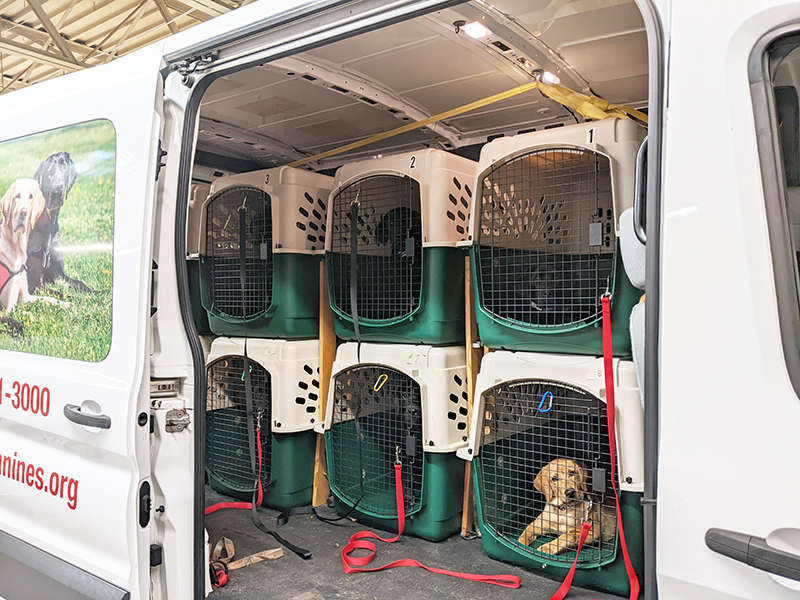 On Tuesday, August 30, Can Do Canines brought seven assistance dogs-in-training to their temporary training home at the Federal Medical Center, located in Rochester, Minn. This resumes this facility’s Prison Puppy Program that has been paused since the pandemic began.
On Tuesday, August 30, Can Do Canines brought seven assistance dogs-in-training to their temporary training home at the Federal Medical Center, located in Rochester, Minn. This resumes this facility’s Prison Puppy Program that has been paused since the pandemic began.
Can Do Canines are assistance dogs trained for clients who live with disabilities that involve mobility challenges, hearing loss or deafness, seizure disorders, diabetes complicated by hypoglycemia unawareness, or childhood autism. Being trained in a prison setting may be one stop on the journey for many of these dogs in training. While there, each dog will share a cell with two inmates, receiving round-the-clock care. These selected male inmates serve to train basic obedience skills and some general assistance dog skills such as retrieving items, opening doors, and activating handicap buttons. A Can Do Canines staff member holds regular training sessions at the prisons to coach the inmates on their important role.
After being at the prison for six months, the dogs will return to the Twin Cities, where they will be placed in a volunteer’s home, before going into final training to determine what type of service dog they will become. Once these dogs are about 2½ years old, they will be placed with a client, free of charge.
However, volunteers are not only needed after these dogs’ time in prison, but during it. Several Rochester-area residents are needed to give dogs participating in the prison program a break for a weekend or a couple of weeks, allowing them more access to societal settings than they experience in prison. Foster volunteer Bill Cunningham says, “Can Do Canines is a great place to volunteer - it doesn’t matter if you have dog training experience or if you have never had a dog before, the seasoned training staff trains you to help train the dogs on their career path. It is all in a collective effort to help set up the puppy or dog for success in the future. All it costs you is your time.”
Can Do Canines currently partners with seven different prisons in Minnesota and Wisconsin. In addition to Rochester, locations include Duluth, Sandstone, and Waseca, Minn., and Chippewa Falls, Stanley, and Black River Falls Wis. The nonprofit has maintained a partnership with the Rochester prison since 2018.
Numerous inmates have shared that this experience has changed their lives, helping them become more responsible and compassionate and giving them a clearer sense of purpose. As Prison Program Manager Kaity Pollard states, “This program is really a win-win situation. The inmates are able to contribute to society in this positive way while Can Do Canines dogs gain valuable and consistent training 24/7.”
Several Rochester media sources shared this news. Here are a few of those links:

 Persistence Pays Off with Diabetes Assist Dog Gracie
Persistence Pays Off with Diabetes Assist Dog Gracie



